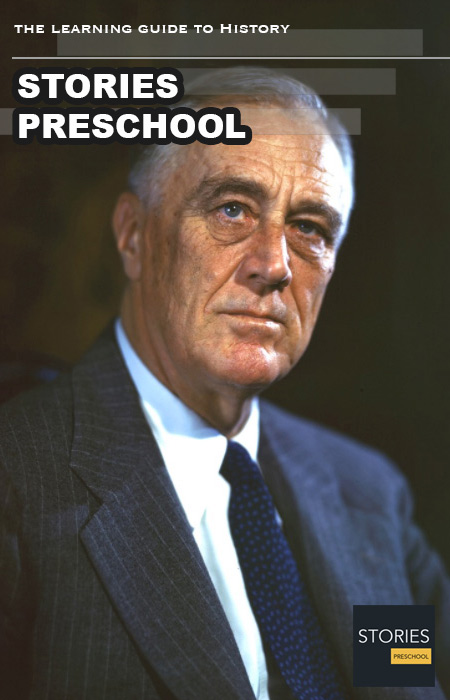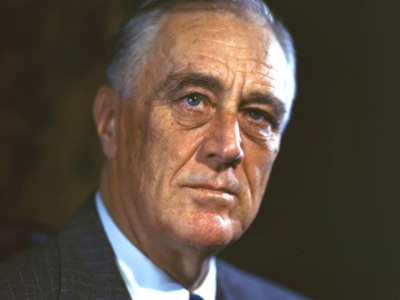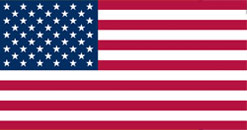Franklin Delano Roosevelt (1882-1945)
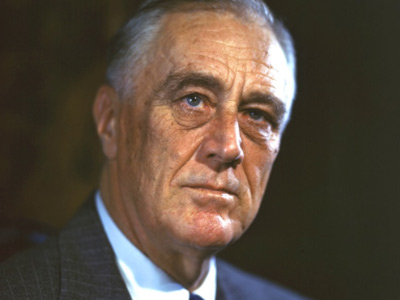
Franklin Delano Roosevelt (January 30, 1882 – April 12, 1945), commonly known as FDR, was an American statesman and political leader who served as the 32nd President of the United States from 1933 until his death in 1945. A Democrat, he won a record four presidential elections and emerged as a central figure in world events during the mid-20th century. He directed the United States government during most of the Great Depression, implementing his New Deal domestic agenda in response to the worst economic crisis in U.S. history. As a dominant leader of his party, he built the New Deal Coalition, realigning American politics into the Fifth Party System and defining American liberalism throughout the middle third of the 20th century. His third and fourth terms were dominated by World War II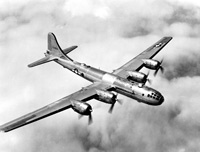 World War II or the Second World War, often abbreviated as WWII or WW2, was a world war that lasted from 1939 to 1945. It involved the vast majority of the world's countries—including all of the great powers—forming two opposing military alliances: the Allies and the Axis powers. World War II was a total war that directly involved more than 100 million personnel from more than 30 countries. World War II is generally considered to have begun on 1 September 1939, when Nazi Germany, under Adolf Hitler, invaded Poland. View World War II », in which the United States aligned with the Allied Powers against the Axis Powers of Nazi Germany
World War II or the Second World War, often abbreviated as WWII or WW2, was a world war that lasted from 1939 to 1945. It involved the vast majority of the world's countries—including all of the great powers—forming two opposing military alliances: the Allies and the Axis powers. World War II was a total war that directly involved more than 100 million personnel from more than 30 countries. World War II is generally considered to have begun on 1 September 1939, when Nazi Germany, under Adolf Hitler, invaded Poland. View World War II », in which the United States aligned with the Allied Powers against the Axis Powers of Nazi Germany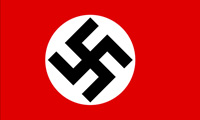 Nazi Germany (officially known as the German Reich from 1933 until 1943, and the Greater German Reich from 1943 to 1945) was the German state between 1933 and 1945, when Adolf Hitler and the Nazi Party controlled the country, transforming it into a dictatorship. Under Hitler's rule, Germany quickly became a totalitarian state where nearly all aspects of life were controlled by the government., Japan
Nazi Germany (officially known as the German Reich from 1933 until 1943, and the Greater German Reich from 1943 to 1945) was the German state between 1933 and 1945, when Adolf Hitler and the Nazi Party controlled the country, transforming it into a dictatorship. Under Hitler's rule, Germany quickly became a totalitarian state where nearly all aspects of life were controlled by the government., Japan The Empire of Japan, also known as the Japanese Empire or Imperial Japan, was a historical nation-state and great power that existed from the Meiji Restoration in 1868 until the enactment of the post-World War II 1947 constitution and subsequent formation of modern Japan. Economic and political turmoil in the 1920s led to the rise of militarism, nationalism and totalitarianism eventually culminating in Japan's membership in the Axis alliance., and Italy
The Empire of Japan, also known as the Japanese Empire or Imperial Japan, was a historical nation-state and great power that existed from the Meiji Restoration in 1868 until the enactment of the post-World War II 1947 constitution and subsequent formation of modern Japan. Economic and political turmoil in the 1920s led to the rise of militarism, nationalism and totalitarianism eventually culminating in Japan's membership in the Axis alliance., and Italy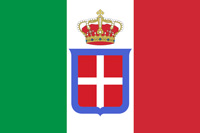 The Kingdom of Italy was a state that existed from 1861, when Victor Emmanuel II of Sardinia was proclaimed King of Italy, until 1946. The state resulted from a decades-long process, the Risorgimento, of consolidating the different states of the Italian Peninsula into a single state. That process was influenced by the Savoy-led Kingdom of Sardinia, which can be considered Italy's legal predecessor state.. He is often rated by scholars as one of the three greatest U.S. Presidents, along with George Washington and Abraham Lincoln.
The Kingdom of Italy was a state that existed from 1861, when Victor Emmanuel II of Sardinia was proclaimed King of Italy, until 1946. The state resulted from a decades-long process, the Risorgimento, of consolidating the different states of the Italian Peninsula into a single state. That process was influenced by the Savoy-led Kingdom of Sardinia, which can be considered Italy's legal predecessor state.. He is often rated by scholars as one of the three greatest U.S. Presidents, along with George Washington and Abraham Lincoln.
Roosevelt was born in 1882 to a prominent Dutch-American New York family and attended Groton School. He went on to graduate from Harvard College in 1903 and attended Columbia Law School before practicing law in New York City. In 1905, he married Eleanor Roosevelt, and the couple went on to have six children. He won election to the New York State Senate and then served as Assistant Secretary of the Navy under President Woodrow Wilson during World War I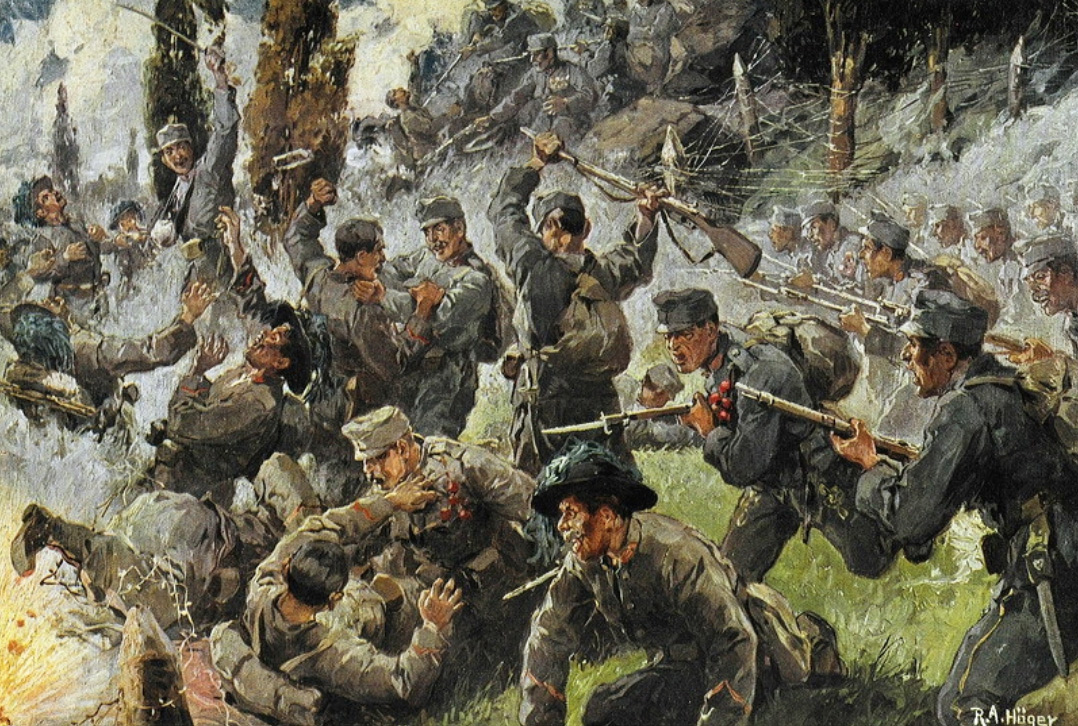 World War I, also known as the First World War, or the Great War, was a global war originating in Europe that lasted from 28 July 1914 to 11 November 1918. More than 70 million military personnel, including 60 million Europeans, were mobilized in one of the largest wars in history. The war drew in all the world's economic great powers, assembled in two opposing alliances: the Allies versus the Central Powers of Germany and Austria-Hungary. View World War I ». Roosevelt was James M. Cox's running mate on the Democratic Party's 1920 national ticket, but Cox was defeated by Warren G. Harding. In 1921, Roosevelt contracted a paralytic illness, which left his legs permanently paralyzed. He attempted to recover from the illness and founded the treatment center in Warm Springs, Georgia for people with poliomyelitis. Roosevelt returned to public office by winning election as Governor of New York in 1928. He was in office from 1929 to 1933 and served as a reform governor, promoting programs to combat the economic crisis besetting the United States
World War I, also known as the First World War, or the Great War, was a global war originating in Europe that lasted from 28 July 1914 to 11 November 1918. More than 70 million military personnel, including 60 million Europeans, were mobilized in one of the largest wars in history. The war drew in all the world's economic great powers, assembled in two opposing alliances: the Allies versus the Central Powers of Germany and Austria-Hungary. View World War I ». Roosevelt was James M. Cox's running mate on the Democratic Party's 1920 national ticket, but Cox was defeated by Warren G. Harding. In 1921, Roosevelt contracted a paralytic illness, which left his legs permanently paralyzed. He attempted to recover from the illness and founded the treatment center in Warm Springs, Georgia for people with poliomyelitis. Roosevelt returned to public office by winning election as Governor of New York in 1928. He was in office from 1929 to 1933 and served as a reform governor, promoting programs to combat the economic crisis besetting the United States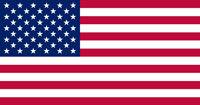 The United States of America (U.S.A. or USA), commonly known as the United States (U.S. or US) or America, is a country in North America. It is the world's third-largest country by both land and total area. The United States shares land borders with Canada to its north and with Mexico to its south. The national capital is Washington, D.C., and the most populous city and financial center is New York City. at the time.
The United States of America (U.S.A. or USA), commonly known as the United States (U.S. or US) or America, is a country in North America. It is the world's third-largest country by both land and total area. The United States shares land borders with Canada to its north and with Mexico to its south. The national capital is Washington, D.C., and the most populous city and financial center is New York City. at the time.
In the 1932 presidential election, Roosevelt defeated Republican President Herbert Hoover in a landslide. Roosevelt took office while the United States was in the midst of the worst economic crisis in its history. During the first 100 days of the 73rd United States Congress, Roosevelt spearheaded unprecedented federal legislation and issued a profusion of executive orders that instituted the New Deal—a variety of programs designed to produce relief, recovery, and reform. He created numerous programs to provide relief to the unemployed and farmers while seeking economic recovery with the National Recovery Administration and other programs. He also instituted major regulatory reforms related to finance, communications, and labor, and presided over the end of Prohibition. The economy improved rapidly from 1933–1937 and Roosevelt won a landslide re-election in 1936, but the economy relapsed into a deep recession in 1937–1938. After the 1936 election, Roosevelt galvanized opposition by seeking passage of the Judiciary Reorganization Bill of 1937, which would have expanded the size of the Supreme Court of the United States. The bipartisan Conservative Coalition that formed in 1937 prevented passage of that bill and blocked the implementation of further New Deal programs and reforms. Major surviving programs and legislation implemented under Roosevelt include the Securities and Exchange Commission, the National Labor Relations Act, the Federal Deposit Insurance Corporation, and Social Security.
Worried about the worsening situation in Europe and Asia, Roosevelt ran for re-election in 1940, and his victory made him the first and only president to serve for more than two terms. With World War II looming after 1938 with the Japanese invasion of China and the aggression of Nazi Germany, Roosevelt gave strong diplomatic and financial support to China, the United Kingdom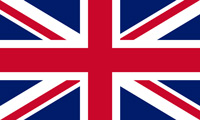 The British Empire, was composed of the dominions, colonies, protectorates, mandates, and other territories ruled or administered by the United Kingdom and its predecessor states. At its height it was the largest empire in history and, for over a century, was the foremost global power. By the start of the 20th century, Germany and the United States had begun to challenge Britain's economic lead., and the Soviet Union
The British Empire, was composed of the dominions, colonies, protectorates, mandates, and other territories ruled or administered by the United Kingdom and its predecessor states. At its height it was the largest empire in history and, for over a century, was the foremost global power. By the start of the 20th century, Germany and the United States had begun to challenge Britain's economic lead., and the Soviet Union Soviet Union, officially the Union of Soviet Socialist Republics (USSR), was a transcontinental country that spanned much of Eurasia from 1922 to 1991. The Soviet Union fall process began with growing unrest in the Union's various constituent national republics developing into an incessant political and legislative conflict between them and the central government. Estonia was the first Soviet republic to declare state sovereignty inside the Union. while remaining officially neutral.
Soviet Union, officially the Union of Soviet Socialist Republics (USSR), was a transcontinental country that spanned much of Eurasia from 1922 to 1991. The Soviet Union fall process began with growing unrest in the Union's various constituent national republics developing into an incessant political and legislative conflict between them and the central government. Estonia was the first Soviet republic to declare state sovereignty inside the Union. while remaining officially neutral.
Following the Japanese surprise attack on Pearl Harbor on December 7, 1941, which he famously called "a date which will live in infamy", Roosevelt sought and obtained a declaration of war on Japan and, a few days later, on Germany and Italy. Assisted by his top aide Harry Hopkins, and with very strong national support, he worked closely with British Prime Minister Winston Churchill, Soviet leader Joseph Stalin and Chinese Generalissimo Chiang Kai-shek in leading the Allies against the Axis Powers. He supervised the mobilization of the U.S. economy to support the war effort and implemented a Germany first strategy that focused on the defeat of Germany over Japan. He also initiated the development of the world's first atomic bomb and worked with the other Allied leaders to lay the groundwork for the United Nations (UN)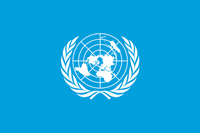 United Nations (UN) is an intergovernmental organization whose stated purposes are to maintain international peace and security, develop friendly relations among nations, achieve international cooperation, and be a centre for harmonizing the actions of nations. The UN was established after World War II with the aim of preventing future world wars, succeeding the League of Nations, which was characterized as ineffective. and other post-war institutions. Roosevelt's physical health seriously declined during the war years, and he died in April 1945, 11 weeks into his fourth term. The Axis Powers surrendered to the Allies in the months following Roosevelt's death, during the presidency of Roosevelt's successor, Harry S. Truman.
United Nations (UN) is an intergovernmental organization whose stated purposes are to maintain international peace and security, develop friendly relations among nations, achieve international cooperation, and be a centre for harmonizing the actions of nations. The UN was established after World War II with the aim of preventing future world wars, succeeding the League of Nations, which was characterized as ineffective. and other post-war institutions. Roosevelt's physical health seriously declined during the war years, and he died in April 1945, 11 weeks into his fourth term. The Axis Powers surrendered to the Allies in the months following Roosevelt's death, during the presidency of Roosevelt's successor, Harry S. Truman.
HISTORY
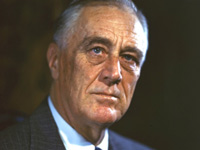
RESOURCES
This article uses material from the Wikipedia article "Franklin Delano Roosevelt (1882-1945)", which is released under the Creative Commons Attribution-Share-Alike License 3.0.
© Stories Preschool. All Rights Reserved.
